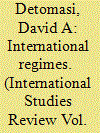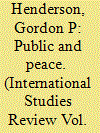|
|
|
Sort Order |
|
|
|
Items / Page
|
|
|
|
|
|
|
| Srl | Item |
| 1 |
ID:
074667


|
|
|
|
|
| Publication |
2006.
|
| Summary/Abstract |
Despite decades of research on coercive diplomacy, the linkage between deterrence and compellence still remains unexplored. The present essay provides both a theoretical and empirical analysis of why studying their linked relationship is desirable. After overviewing the literature, it investigates the interplay between US strategies of deterrence and compellence in the First Gulf Crisis (1990-1991), suggesting that the deterrence-compellence linkage is stronger when the two strategies coexist or after they have coexisted. In particular, such a linkage was absent at the beginning of the First Gulf Crisis but very much present from the middle of the crisis until its end. Although this essay represents only a preliminary foray into exploring the potential linkage between deterrence and compellence, it appears that a better grasp of this relationship could provide us with the tools to counteract as well as reduce the negative effects of miscalculation and misperception, practices that are partially responsible for unpredicted and unwanted outcomes in international politics.
|
|
|
|
|
|
|
|
|
|
|
|
|
|
|
|
| 2 |
ID:
074666


|
|
|
|
|
| Publication |
2006.
|
| Summary/Abstract |
Accounting and financial scandals of unprecedented scale have recently occurred in the United States, Europe, and elsewhere. Much of the cause for these scandals has been attributed to the poor corporate governance standards practiced by the offending companies, leading researchers to re-examine how corporate governance affects economic development. One topic receiving significant research attention has been whether national corporate governance systems are likely to converge, what form that convergence may take, and what barriers currently inhibit convergence. This essay argues that the tools of regime theory hold significant potential for helping to structure empirical inquiry into the process of corporate governance convergence. It then draws upon the recent experience of Western corporate governance systems to illustrate how a consensus on norms, values, and principles in the issue area of corporate governance is emerging. The essay concludes by drawing out the implications of the developing corporate governance regime for emerging market economies and the general topic of global governance. It also poses questions for continued empirical research in the area of corporate governance and international relations.
|
|
|
|
|
|
|
|
|
|
|
|
|
|
|
|
| 3 |
ID:
074665


|
|
|
|
|
| Publication |
2006.
|
| Summary/Abstract |
As policymakers are increasingly tempted to act on the apparent pacifying virtues of democratization, some scholars struggle to give them reliable reasons for why it occurs while others warn of the dangers of acting on empirical regularities whose nature and cause are not fully understood. This essay undertakes a review of the democratic peace literature in order to document its largely implicit, but sometimes explicit, conceptualizations of the role of democratic citizens in achieving or frustrating the democratic peace. Because citizenship is a distinctive and defining characteristic of democracy, it may well, and perhaps ought to, be the main source of explanation for the democratic peace. The essay begins by showing that the Enlightenment social contract tradition (for example, Hobbes, Locke, Rousseau, and Kant) is oriented toward the achievement of domestic and international peace and that the parties to the contract-the citizens-are responsible for desiring, achieving, and maintaining peace. The essay then proceeds to categorize and review the democratic peace literature according to the degree of support found for this proposition and the role of citizens in achieving or obstructing peace.
|
|
|
|
|
|
|
|
|
|
|
|
|
|
|
|
|
|
|
|
|